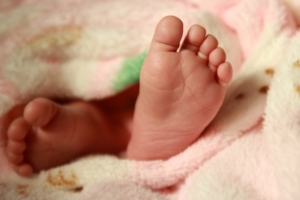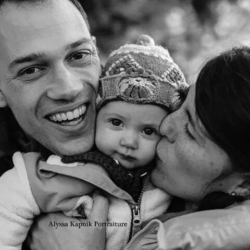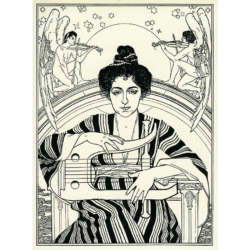| Hebrew | English |
|---|---|
Welcome. These sheets contain an explanation of this morning’s ceremony as well as the texts for the siyyum and naming ceremony and birkat hamazon. Thank you for participating in this joyous event. | |
The Day | |
We name our daughters on their fifteenth day of life. This is based on Vayiqra 12:1-5, which describes the length of a woman’s period of impurity after childbirth. If she gives birth to a son, she is impure for seven days; if she gives birth to a daughter, she is impure for fourteen days. The passage seems to connect the baby boy’s circumcision on the eighth day to the conclusion of the mother’s seven day period of impurity. (Similarly, Vayiqra 22:27 says that a newborn animal must remain with its mother for seven days, and on the eighth day and onward it is acceptable as a sacrificial offering.) It seems, then, that for the first seven days of a little boy’s life, and the first fourteen days of a little girl’s life, the child and mother are still closely linked, and both remain separate from the larger family and community. Then, on the eighth day of her son’s life, and on the fifteenth day of her daughter’s life, the mother begins to rejoin her family and community, and the child too becomes incorporated as a member of the family and community. That is why a baby boy’s father becomes obligated to circumcise his son only on the eighth day, and why the baby boy first receives his name at his brit milah; it is then that the baby boy becomes a member of the community of Israel. On our daughter’s fifteenth day, we come together as a family and as a community to welcome this new member and to give her a name. | |
The Siyyum | |
A siyyum is a ceremony marking the completion of the study of a tractate of the Talmud, and rededicating the participants to a commitment to further study. We name each of our sons and daughters at a siyyum celebrating our joint study during the period of time that we are expecting the birth of our child. This is both a way of privately rededicating ourselves to Torah study and a way of publicly welcoming our children into a community joined together in the study of Torah. Our siyyum this morning is on tractate Shevi’it. from the Palestinian Talmud, in recognition of our baby’s birth during shemita, the sabbatical year in Israel. (See accompanying sheets for the texts that will be studied and for the text of the siyyum ceremony.) | |
Please stand for the conclusion of the siyyum and remain standing throughout the naming ceremony. | |
The Naming Ceremony | |
In gratitude for a healthy delivery for mother and baby, Devora will say birkat hagomel (the blessing for one who survives a dangerous experience). In recognition of the particular circumstances of this birth, the blessing will be introduced by the singing of a portion of Hallel, “ma ashiv” (end of Tehilim 116), led by David. | |
Our daughter will enter and leave the room to the singing of biblical verses excerpted from blessings to children. The song to which she will enter begins with Bereishit 48:16, from the passage in which Ya’aqov blesses Yosef and his sons, Menashe and Efraim: “May the angel who has redeemed me from all evil bless the lads, and let my name and the name of my fathers Avraham and Yitzḥaq be called on them, and may they grow into a multitude in the midst of the earth. ״ The song continues with Devarim 1:10, from the introduction to Moshe’s address to the Children of Israel: “The Lord your God has multiplied you, and, behold, you are this day like the stars of heaven for multitude.” | |
After our daughter enters the room, David and Devora will say birkat hatov vehameitiv (the blessing “who is good and does good”). | |
Our daughter will be named and blessed with a prayer which incorporates biblical verses celebrating the miracle of birth: | |
אֱלֹהֵינוּ וְאֱלֹהֵי אָבוֹתֵינוּ בּרֵךְ אֶת הַילְדָה הַזֹאת וְיִקָּרֵא שְׁמָהּ בְּיִשְׂרָאֵל ________________בַּת ____________וְ__________. |
Our Lord and the Lord of our ancestors, bless this girl, and let her name in Israel be called _____ daughter of________and________. |
יִשְׂמַח הָאָב בְּיוֹצֵא חֲלָצָיו וְתָגֵל אִמָּהּ בִּפְרִי בִּטְנָהּ, כַּכָּתוּב: יִשְׂמַח אָבִיךָ וְאִמֶּךָ וְתָגֵל יוֹלַדְתֶּךָ. (משלי כג: כה) הָגֵן עָלֶיהָ בְּרוֹב חַסְדֶּךָ, כַּכָּתוּב: וְחֶסֶד ה’ מֵעוֹלָם וְעַד עוֹלָם עַל יְרֵאָיו וְצִדְקָתוֹ לִבְנֵי בָנִים. (תהילים קג:יז) וְנֱאֶמַר: וְעַתָּה ה’ אָבִינוּ אָתָּה אֲנַחְנוּ הַחֹמֶר וְאַתָּה יֹצְרֵנוּ וּמַעֲשֵׂה יָדְךָ כֻּלָּנוּ. (ישעיה סד:ז) וְנֱאֶמָר: כִּי אַתָּה קָנִיתָ כִלְיֹתָי תְּסֻכֵּנִי בְּבֶטֶן אִמִּי. אוֹדְךָ עַל כִּי נוֹרָאוֹת נִפְלֵיתִי נִפְלָאִים מַעֲשֶׂיךָ וְנַפְשִׁי יֹדַעַת מְאֹד. (תהילים קלט:יג-יד) וְנֱאֶמַר: יוֹדוּ לַה’ חַסְדּוֹ וְנִפְלְאוֹתָיו לִבְנֵי אָדָם. (תהילים קז:ח) הוֹדוּ לַה’ כִּי טוֹב כִּי לְעוֹלָם חַסְדּוֹ (תהילים קיח:א) [הקהל עונה: הוֹדוּ לַה’ כִּי טוֹב כִּי לְעוֹלָם חַסְדּוֹ] |
May the father be glad in that which came forth from his loins and the mother rejoice in the fruit of her womb, as it is written: May your father and your mother be glad, and may she who bore you rejoice. (Mishlei 23:25) Protect her with your abundant grace, as it is written: But the grace of God is from everlasting to everlasting upon those who fear him, and his righteousness to children’s children. (Tehilim 103:17) And it says: But now, God, you are our father; we are the clay and you are our shaper, and the work of your hand are we all. (Yeshayahu 64:7) And it says: For you have formed my inner parts, you have knit me together in my mother’s womb. I will praise you because I am fearfully and wonderfully made; wonderful are your works, and my soul knows that well. (Tehilim 139:13-14) And it says: Let them praise God for his grace, and his wonders to humankind. (Tehilim 107:7) Give praise to God. for he is good, for his grace endures forever. (Tehilim 118:1) [All respond: Give praise to God, for he is good, for his grace endures forever.] |
מי שברך אבותינו אברהם יצחק ויעקב שרה רבקה רחל ולאה הוא יברך את________בת _________ויזכו אביה ואמה לגדלה לתורה ולחופה ולמעשים טובים ונאמר אמן. |
May he who blessed our ancestors, Avraham, Yitsḥaq, and Ya’aqov, Sara, Rivqa, Raḥel, and Laya, bless________daughter of________and________, and may her father and mother merit to raise her to Torah, the marriage canopy, and good deeds. |
Devora and David will then bless their child with the traditional blessing for daughters and the priestly blessing. Our daughter will leave the room with the singing of Bereishit 27:28, the beginning of Yitsḥaq’s blessing to Ya’aqov: “May God give you of the dew of heaven and of the fat of the earth and an abundance of grain and wine.” | |
The Meal | |
All the participants join together in a seudat mitsvah. Birkat hamazon will be introduced with a special zimmun and will include special prayers blessing the parents, the child, and the participants, and praying for peace (see accompanying sheet). | |
ברכת המזון | Birkat haMazon |
שִׁיר הַמַּעֲלוֹת, בְּשׁוּב ה׳ אֶת שִׁיבַת צִיּוֹן, הָיִֽינוּ כְּחֹלְמִים. אָז יִמָּלֵא שְׂחוֹק פִּֽינוּ וּלְשׁוֹנֵֽנוּ רִנָּה, אָז יֹאמְרוּ בַגּוֹיִם, הִגְדִּיל ה׳ לַעֲשׂוֹת עִם אֵֽלֶּה. הִגְדִּיל ה׳ לַעֲשׂוֹת עִמָּֽנוּ, הָיִֽינוּ שְׂמֵחִים. שׁוּבָה ה׳ אֶת שְׁבִיתֵֽנוּ, כַּאֲפִיקִים בַּנֶּֽגֶב. הַזֹּרְעִים בְּדִמְעָה, בְּרִנָּה יִקְצֹֽרוּ. הָלוֹךְ יֵלֵךְ וּבָכֹה נֹשֵׂא מֶֽשֶׁךְ הַזָּֽרַע, בֹּא יָבֹא בְרִנָּה נֹשֵׂא אֲלֻמֹּתָיו. | |
Leader: | |
רַבּוֹתַי, נְבָרֵךְ. | |
Everyone: | |
יְהִי שֵׁם ה׳ מְבֹרָךְ מֵעַתָּה וְעַד עוֹלָם. | |
Leader: | |
יְהִי שֵׁם ה׳ מְבֹרָךְ מֵעַתָּה וְעַד עוֹלָם. נוֹדֶה לְשִׁמְךָ בְּתוֹךְ אֱמוּנַי, בְּרוּכִים אַתֶּם לַה׳. | |
Everyone: | |
נוֹדֶה לְשִׁמְךָ בְּתוֹךְ אֱמוּנַי, בְּרוּכִים אַתֶּם לַה׳. | |
Leader: | |
בִּרְשׁוּת אֵל אָיוֹם וְנוֹרָא, מִשְׂגָּב לְעִתּוֹת בַּצָּרָה, אֵל נֶאְזָר בִּגְבוּרָה, אַדִּיר בַּמָּרוֹם ה׳. | |
Everyone: | |
נוֹדֶה לְשִׁמְךָ בְּתוֹךְ אֱמוּנַי, בְּרוּכִים אַתֶּם לַה׳. | |
Leader: | |
בִּרְשׁוּת הַתּוֹרָה הַקְּדוֹשָׁה, טְהוֹרָה הִיא וְגַם פְּרוּשָׁה, צִוָּה לָֽנוּ מוֹרָשָׁה, מֹשֶׁה עֶֽבֶד ה׳. | |
Everyone: | |
נוֹדֶה לְשִׁמְךָ בְּתוֹךְ אֱמוּנַי, בְּרוּכִים אַתֶּם לַה׳. | |
Leader: | |
בִּרְשׁוּת הַכֹּהֲנִים וְהַלְוִיִם, אֶקְרָא לֵאלֹהֵי הָעִבְרִיִּים, אֲהוֹדֶֽנּוּ בְּכָל אִיִּים, אֲבָרְכָה אֶת ה׳. | |
Everyone: | |
נוֹדֶה לְשִׁמְךָ בְּתוֹךְ אֱמוּנַי, בְּרוּכִים אַתֶּם לַה׳. | |
Leader: | |
בִּרְשׁוּת מָרָנָן וְרַבּוֹתַי, אֶפְתְּחָה בְּשִׁיר פִּי וּשְׂפָתַי, וְתֹאמַֽרְנָה עַצְמוֹתַי, בָּרוּךְ הַבָּא בְּשֵׁם ה׳. | |
Everyone: | |
נוֹדֶה לְשִׁמְךָ בְּתוֹךְ אֱמוּנַי, בְּרוּכִים אַתֶּם לַה׳. | |
Leader: | |
בִּרְשׁוּת מָרָנָן וְרַבָּנָן וְרַבּוֹתַי, נְבָרֵךְ (אֱלֹהֵֽינוּ) שֶׁאָכַֽלְנוּ מִשֶּׁלּוֹ. | |
Everyone: | |
בָּרוּךְ (אֱלֹהֵֽינוּ) שֶׁאָכַֽלְנוּ מִשֶּׁלּוֹ וּבְטוּבוֹ חָיִֽינוּ. | |
Leader: | |
בָּרוּךְ (אֱלֹהֵֽינוּ) שֶׁאָכַֽלְנוּ מִשֶּׁלּוֹ וּבְטוּבוֹ חָיִֽינוּ. | |
Everyone: | |
בָּרוּךְ הוּא וּבָרוּךְ שְׁמוֹ. | |
בָּרוּךְ אַתָּה ה׳, אֱלֹהֵֽינוּ מֶֽלֶךְ הָעוֹלָם, הַזָּן אֶת הָעוֹלָם כֻּלּוֹ בְּטוּבוֹ בְּחֵן בְּחֶֽסֶד וּבְרַחֲמִים, הוּא נוֹתֵן לֶֽחֶם לְכָל בָּשָׂר כִּי לְעוֹלָם חַסְדּוֹ. וּבְטוּבוֹ הַגָּדוֹל תָּמִיד לֹא חָֽסַר לָֽנוּ, וְאַל יֶחְסַר לָֽנוּ מָזוֹן לְעוֹלָם וָעֶד. בַּעֲבוּר שְׁמוֹ הַגָּדוֹל, כִּי הוּא אֵל זָן וּמְפַרְנֵס לַכֹּל וּמֵטִיב לַכֹּל, וּמֵכִין מָזוֹן לְכָל בְּרִיּוֹתָיו אֲשֶׁר בָּרָא. בָּרוּךְ אַתָּה ה׳, הַזָּן אֶת הַכֹּל. | |
נֽוֹדֶה לְּךָ, ה׳ אֱלֹהֵֽינוּ, עַל שֶׁהִנְחַֽלְתָּ לַאֲבוֹתֵֽינוּ אֶֽרֶץ חֶמְדָּה טוֹבָה וּרְחָבָה, וְעַל שֶׁהוֹצֵאתָֽנוּ, ה׳ אֱלֹהֵֽינוּ, מֵאֶֽרֶץ מִצְרַֽים, וּפְדִיתָֽנוּ מִבֵּית עֲבָדִים, וְעַל בְּרִיתְךָ שֶׁחָתַֽמְתָּ בִּבְשָׂרֵֽנוּ, וְעַל תּוֹרָתְךָ שֶׁלִּמַּדְתָּֽנוּ, וְעַל חֻקֶּֽיךָ שֶׁהוֹדַעְתָּֽנוּ, וְעַל חַיִּים חֵן וָחֶֽסֶד שֶׁחוֹנַנְתָּֽנוּ, וְעַל אֲכִילַת מָזוֹן שָׁאַתָּה זָן וּמְפַרְנֵס אוֹתָֽנוּ תָּמִיד, בְּכָל יוֹם וּבְכָל עֵת וּבְכָל שָׁעָה. | |
וְעַל הַכֹּל, ה׳ אֱלֹהֵֽינוּ, אֲנַֽחְנוּ מוֹדִים לָךְ, וּמְבָרְכִים אוֹתָךְ, יִתְבָּרַךְ שִׁמְךָ בְּפִי כָּל חַי תָּמִיד לְעוֹלָם וָעֶד. כַּכָּתוּב, וְאָכַלְתָּ וְשָׂבָֽעְתָּ, וּבֵרַכְתָּ אֶת ה׳ אֱלֹהֶֽיךָ עַל הָאָֽרֶץ הַטֹּבָה אֲשֶׁר נָֽתַן לָךְ. בָּרוּךְ אַתָּה ה׳, עַל הָאָֽרֶץ וְעַל הַמָּזוֹן. | |
רַחֵם, ה׳ אֱלֹהֵֽינוּ, עַל יִשְׂרָאֵל עַמֶּֽךָ, וְעַל יְרוּשָׁלַֽיִם עִירֶֽךָ, וְעַל צִיּוֹן מִשְׁכַּן כְּבוֹדֶֽךָ, וְעַל מַלְכוּת בֵּית דָּוִד מְשִׁיחֶֽךָ, וְעַל הַבַּֽיִת הַגָּדוֹל וְהַקָּדוֹשׁ שֶׁנִּקְרָא שִׁמְךָ עָלָיו. אֱלֹהֵֽינוּ, אָבִֽינוּ, רְעֵֽנוּ, זוּנֵֽנוּ, פַּרְנְסֵֽנוּ, וְכַלְכְּלֵֽנוּ, וְהַרְוִיחֵֽנוּ, וְהַרְוַח לָֽנוּ ה׳ אֱלֹהֵֽינוּ מְהֵרָה מִכָּל צָרוֹתֵֽינוּ, וְנָא אַל תַּצְרִיכֵֽנוּ, ה׳ אֱלֹהֵֽינוּ, לֹא לִידֵי מַתְּנַת בָּשָׂר וָדָם, וְלֹא לִידֵי הַלְוָאָתָם, כִּי אִם לְיָדְךָ הַמְּלֵאָה, הַפְּתוּחָה, הַקְּדוֹשָׁה וְהָרְחָבָה, שֶׁלֹּא נֵבוֹשׁ וְלֹא נִכָּלֵם לְעוֹלָם וָעֶד. | |
וּבְנֵה יְרוּשָׁלַֽיִם עִיר הַקֹּֽדֶשׁ בִּמְהֵרָה בְיָמֵֽינוּ. בָּרוּךְ אַתָּה ה׳, בּוֹנֵה בְרַחֲמָיו יְרוּשָׁלָֽיִם. אָמֵן | |
בָּרוּךְ אַתָּה ה׳ אֱלֹהֵֽינוּ מֶֽלֶךְ הָעוֹלָם, הָאֵל, אָבִֽינוּ, מַלְכֵּֽנוּ, אַדִּירֵֽנוּ, בּוֹרְאֵֽנוּ, גּוֹאֲלֵֽנוּ, יוֹצְרֵֽנוּ, קְדוֹשֵֽׁנוּ קְדוֹשׁ יַעֲקֹב, רוֹעֵֽנוּ רוֹעֵה יִשְׂרָאֵל, הַמֶּֽלֶךְ הַטּוֹב וְהַמֵּטִיב לַכֹּל, שֶׁבְּכָל יוֹם וָיוֹם הוּא הֵטִיב, הוּא מֵטִיב, הוּא יֵיטִיב לָֽנוּ. הוּא גְמָלָֽנוּ, הוּא גוֹמְלֵֽנוּ, הוּא יִגְמְלֵֽנוּ לָעַד, לְחֵן וּלְחֶֽסֶד וּלְרַחֲמִים וּלְרֶֽוַח הַצָּלָה וְהַצְלָחָה, בְּרָכָה וִישׁוּעָה, נֶחָמָה, פַּרְנָסָה וְכַלְכָּלָה, וְרַחֲמִים וְחַיִּים וְשָׁלוֹם וְכָל טוֹב, וּמִכָּל טוּב לְעוֹלָם אַל יְחַסְּרֵֽנוּ. | |
הָרַחֲמָן, הוּא יִמְלוֹךְ עָלֵֽינוּ לְעוֹלָם וָעֶד. | |
הָרַחֲמָן, הוּא יִתְבָּרַךְ בַּשָׁמַֽיִם וּבָאָֽרֶץ. | |
הָרַחֲמָן, הוּא יִשְׁתַּבַּח לְדוֹר דּוֹרִים, וְיִתְפָּֽאַר בָּֽנוּ לָעַד וּלְנֵֽצַח נְצָחִים, וְיִתְהַדַּר בָּֽנוּ לָעַד וּלְעוֹלְמֵי עוֹלָמִים. | |
הָרַחֲמָן, הוּא יְפַרְנְסֵֽנוּ בְּכָבוֹד. | |
הָרַחֲמָן, הוּא יִשְׁבּוֹר עֻלֵּֽנוּ מֵעַל צַוָּארֵֽנוּ וְהוּא יוֹלִיכֵֽנוּ קוֹמְמִיּוּת לְאַרְצֵֽנוּ. | |
הָרַחֲמָן, הוּא יִשְׁלַח לָֽנוּ בְּרָכָה מְרֻבָּה בַּבַּֽיִת הַזֶּה, וְעַל שֻׁלְחָן זֶה שֶׁאָכַֽלְנוּ עָלָיו. | |
הָרַחֲמָן, הוּא יִשְׁלַח לָֽנוּ אֶת אֵלִיָּֽהוּ הַנָּבִיא זָכוּר לַטּוֹב, וִיבַשֶּׂר לָֽנוּ בְּשׂוֹרוֹת טוֹבוֹת יְשׁוּעוֹת וְנֶחָמוֹת. | |
הָרַחֲמָן, הוּא יְבָרֵךְ אֶת כָּל הַמְסֻבִּין כָּאן, אוֹתָם וְאֶת בֵּיתָם וְאֶת זַרְעָם וְאֶת כָּל אֲשֶׁר לָהֶם, | |
אוֹתָֽנוּ וְאֶת כָּל אֲשֶׁר לָֽנוּ, כְּמוֹ שֶׁנִתְבָּרְכוּ אֲבוֹתֵֽינוּ, אַבְרָהָם יִצְחָק וְיַעֲקֹב, בַּכֹּל, מִכֹּל, כֹּל, כֵּן יְבָרֵךְ אוֹתָֽנוּ כֻּלָּֽנוּ יַֽחַד בִּבְרָכָה שְׁלֵמָה, וְנֹאמַר אָמֵן. | |
בַּמָּרוֹם יְלַמְּדוּ עֲלֵיהֶם וְעָלֵֽינוּ זְכוּת, שֶׁתְּהֵא לְמִשְׁמֶֽרֶת שָׁלוֹם, וְנִשָּׂא בְרָכָה מֵאֵת ה׳, וּצְדָקָה מֵאֱלֹהֵי יִשְׁעֵֽנוּ, וְנִמְצָא חֵן וְשֵֽׂכֶל טוֹב בְּעֵינֵי אֱלֹהִים וְאָדָם. | |
הָרַחֲמָן הוּא יְבָרֵךְ אַבִי וְאֵם הַיַלְדָה וְיִזְכּוּ לְגַדְלָה וּלְחַנְכָה וְּלְחַכְּמָה לְמַעֲשִים טוֹבִים וּלְקִדוּשֵׁי חוּפָּה וּלְלִימוּד הַתּוֹרָה התְּמִימָה וְהַנֶאֱמָנָה. | |
הָרַחֲמָן הוּא יְבָרֵךְ אֶת אֲחוֹתֵינוּ הַקְטַנָה בְּחָכְמָה בְּשַׁלְוָה וּבִגְבוּרָה דְרָכָיו וְאוֹרְחוֹתָיו יְלַמֵד אוֹתָה וּתְהִי תּוֹרַת חֶסֶד עַל לְשׁוֹנָהּ. | |
הָרַחֲמָן הוּא יְבָרֵךְ אֶת כָּל הַנֶאֱסָפִים הַמַקְדִימִים בְּשָׁלוֹם וּבְשִֹמְחָה נִקְהָלִים בְּרוּכָה אַתְּ בִּתִּי בְּיַחַד עוֹנִים אֵלֶה פֹּה הַיוֹם כּוּלָנוּ חַיִים. | |
הָרַחֲמָן הָעוֹשֶֹה שָׁלוֹם בִּמְרוֹמָיו יָחוּס עַל עַמוֹ וְיִפְרֹשֹ כְּנָפָיו יָעִיר קִנוֹ, יְרַחֵף עַל בָּנָיו לְרַחֵם, לְנַחֵם בִּבְרָכָה שְׁלוֹמָיו.[1] These four indented Harahaman stanzas were written by Dr. Devora Steinmetz and R’ David Silber, and are shared with a Creative Commons By Attribution ShareAlike 3.0 Unported license. | |
הָרַחֲמָן, הוּא יְזַכֵּֽנוּ לִימוֹת הַמָּשִֽׁיחַ וּלְחַיֵּי הָעוֹלָם הַבָּא. | |
מַגְדִּיל יְשׁוּעוֹת מַלְכּוֹ, וְעֹֽשֶׂה חֶֽסֶד לִמְשִׁיחוֹ לְדָוִד וּלְזַרְעוֹ עַד עוֹלָם. עֹשֶׂה שָׁלוֹם בִּמְרוֹמָיו, הוּא יַעֲשֶׂה שָׁלוֹם עָלֵֽינוּ וְעַל כָּל יִשְׂרָאֵל, וְאִמְרוּ אָמֵן. | |
יְראוּ אֶת ה׳ קְדוֹשָׁיו, כִּי אֵין מַחְסוֹר לִירֵאָיו. כְּפִירִים רָשׁוּ וְרָעֵֽבוּ, וְדוֹרְשֵׁי ה׳ לֹא יַחְסְרוּ כָל טוֹב. הוֹדוּ לַה׳ כִּי טוֹב, כִּי לְעוֹלָם חַסְדּוֹ. פּוֹתֵֽחַ אֶת יָדֶֽךָ, וּמַשְׂבִּֽיעַ לְכָל חַי רָצוֹן. בָּרוּךְ הַגֶּֽבֶר אֲשֶׁר יִבְטַח בַּה׳, וְהָיָה ה׳ מִבְטַחוֹ. נַֽעַר הָיִֽיתִי גַם זָקַֽנְתִּי, וְלֹא רָאִֽיתִי צַדִּיק נֶעֱזָב, וְזַרְעוֹ מְבַקֶּשׁ לָֽחֶם. ה׳ עֹז לְעַמּוֹ יִתֵּן, ה׳ יְבָרֵךְ אֶת עַמּוֹ בַשָּׁלוֹם. |
Notes
| 1 | These four indented Harahaman stanzas were written by Dr. Devora Steinmetz and R’ David Silber, and are shared with a Creative Commons By Attribution ShareAlike 3.0 Unported license. |
|---|

“שמחת בת | Simḥat Bat, by Dr. Devora Steinmetz and Rabbi David Silber (1987)” is shared through the Open Siddur Project with a Creative Commons Attribution-ShareAlike 4.0 International copyleft license.










Leave a Reply